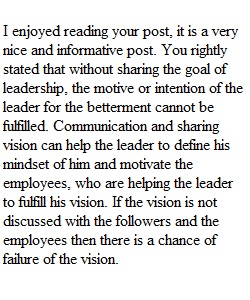


Q The Chapter 4 discussion question deals with problems of communication in the criminal justice agencies, e.g., the police, courts and corrections. I believe this could obviously apply to many other organizations outside the criminal justice arena as well. Leadership roles are changing from control to providing support for people to do what they are brought in to do. Leadership visions for an organization are inadequate if they are not shared with constituents. Communication is a key point of focus in this regard. Decisions pertaining to communication, on many levels, can have significant implications. That pertains, in part, to the manner in which the communication takes place, those receiving the communication, the nature and extent of the communication and the potential impact of the communication. Becoming a credible leader requires that you find your voice. That voice will not always be the same. Adjustments are often needed and can be impacted by many factors, including but not limited to the nature of the communication, the audience, the timing, and the topic. The potential implications, including to various stakeholders in different capacities, should be anticipated to the extent possible. In criminal justice, it is imperative to build trust with those whom you serve. The commitment to developing sound strategic plans, as well as policies and procedures, will be judged by your stakeholders' belief in your ability to carry them out. Something else to consider is that the demographics of United States are diverse, with communities and workforces that are multicultural. Diversity includes many different racial and ethnic groups. Communication in a diverse society requires accounting for diversity and multiculturalism. Beliefs, values, and patterns of thinking differ among these diverse groups. Along with diversity and multiculturalism come challenges and complexities for those in public safety, at all levels. Challenges include, but are not limited to legal compliance, management of prejudice, and ethical compliance. For this discussion I would like for you to consider the following "prompts." • Are leadership visions for organizations inadequate if not shared with constituents. • What are the implications associated with sharing, or not sharing, a vision with constituents in a criminal justice organization context. • How would you as the leader ensure that all cultures and individuals are included in the creation of a climate of trust and shared responsibility in a criminal justice organization. Notice there are essentially questions I ask you in order for you to get your head wrapped around the topic. When you write your response there is no need to write the question and answer it separately or to answer every single question. Write a discussion, a brief 150 to 200 word Main Post hitting the highlights. I have divided the class into groups for the purposes of this discussion. I believe this will make it easier to collaborate with your peers. You will submit your main post below, just hit reply. If you like you could type out your main post in a "Word" doc. and copy it into the "reply" box. Read the Discussion Participation Guidelines prior to submission. This is the expectation for all discussions within this course.
View Related Questions